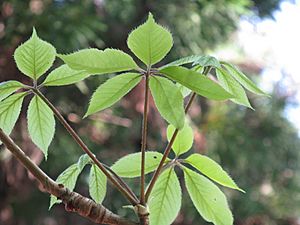Chengiopanax sciadophylloides facts for kids
Quick facts for kids Chengiopanax sciadophylloides |
|
|---|---|
 |
|
| Scientific classification | |
| Kingdom: | |
| (unranked): | |
| (unranked): | |
| (unranked): | |
| Order: | |
| Family: | |
| Genus: |
Chengiopanax
|
| Species: |
Chengiopanax sciadophylloides
|
| Binomial name | |
| Chengiopanax sciadophylloides (Franch. & Sav.) C.B.Shang & J.Y.Huang
|
|
| Synonyms | |
|
Synonymy
Acanthopanax sciadophylloides Franch. & Sav.
Eleutherococcus sciadophylloides (Franch. & Sav.) H.Ohashi Kalopanax sciadophylloides (Franch. & Sav.) Harms |
|
Chengiopanax sciadophylloides is a special kind of flowering tree. It belongs to the Araliaceae family, which also includes ginseng. This tree grows naturally in Japan. It used to be grouped with other plants that have spines, but scientists found it's different because it doesn't have any sharp thorns.
Contents
Amazing Plant Abilities
This tree has some very interesting natural abilities. It can take in certain elements from the soil.
Manganese Magnet
Chengiopanax sciadophylloides is known as a "hyperaccumulator" of manganese. This means it can absorb and store a lot of manganese in its leaves. It does this even when there isn't a huge amount of manganese in the soil. Scientists have found up to 23 grams of manganese in just one kilogram of dried leaves from wild plants.
Absorbing Other Elements
After a nuclear power plant incident in Japan in 2011, scientists studied how plants absorbed different elements. They found that Chengiopanax sciadophylloides also absorbed a specific type of caesium. This was true even in areas quite far from the power plant. The leaves of these trees had much higher levels of caesium compared to other trees. This shows how good this plant is at taking in elements from its environment.
Uses of the Tree
This tree is very useful in Japan. People use its young leaves for food, and parts of the tree have been used in traditional medicine. Its wood is also valued for different purposes.
Delicious Mountain Vegetable
In Japanese cuisine, the young leaves of Chengiopanax sciadophylloides are called koshiabura. People gather them in the spring as "sansai", which means "mountain vegetables". It's so popular that some call it the "queen of sansai".
- It's often used in tempura, where the leaves are lightly battered and fried.
- It's also popular in many other dishes.
- The very best buds are small, like a calligraphy brush, and are called fude ha (meaning "leaf of brush").
Traditional Medicine
In some parts of Japan, like the Niigata Prefecture, people used parts of the tree as a folk remedy.
- They would make a special drink from the roots.
- Tea was also made from the root bark or the leaves.
Special Lacquer
Long ago, people used to make a special coating material called kinshitsu from the sap of this tree.
- The sap would harden into a strong, shiny varnish when exposed to sunlight.
- This lacquer was used to protect things like samurai armor and helmets from rust.
- Similar lacquers were used in ancient China and Korea.
Strong Wood
The wood from Chengiopanax sciadophylloides is also very useful.
- It's used for general building projects.
- It's also used to make chopsticks.
- In the Sasano-Bori doll carving tradition in Yonezawa, Yamagata, the wood is highly valued. It's considered lucky and is prized for being both strong and flexible.
 | James B. Knighten |
 | Azellia White |
 | Willa Brown |

